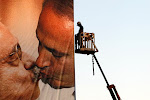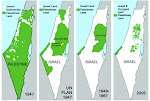Checkpoint: Backscatter Fears and Naked Aggression

"Don't touch my junk" has a corollary: don't zap my gonads with radiation, either.
Americans on the go are increasingly upset about the intrusiveness of pre-boarding security checks at their airports, whether by full-body scanner or an enhanced pat-down grope. Perhaps lessons can be learned by examining the health effects on Palestinians who have for years submitted to similar security checks.
More than a quarter million Palestinians live in the shadow of the Israeli's separation barrier, particularly in spots where the barrier is jig-sawed to protect hilltop settlers in what they refer to as Judea and Samaria. Ostensibly to deter terrorists, a tall electrified fence and trench system disconnects many Palestinian families living in such isolated rural pockets from their families and jobs in the West Bank. (Gaza is entirely corralled, and any patients and accompanying medical staff who are permitted to leave the enclave undergo such body scans as well.) In order for West Bank residents to reach jobs outside these restricted zones, to see friends and relatives, shop, or even make bank deposits, an Israeli-issued permit is required. All permit-holders must line up to be checked by private Israeli armed security guards or national border police before they are allowed past the separation barrier.
Crossing the Reihan/Bartaa checkpoint into the rest of the West Bank entails a full body backscatter x-ray scan, using machines similar to the bulky TSA scanners at 68 American airports which have raised the hackles of travelers this month.
Like US pilots who object to any extra doses of radiation caused by these virtual strip-searches, many Palestinian women are reluctant to undergo full-body scans twice a day, repeatedly. Even though their refusal denies them access to work or to harvest family fields that lie on the other side of the barrier, many resist.
Three years ago, I interviewed more than a dozen women at a basic health clinic in Um el Reihan run by a Western foreign aid agency. Each one said she was too scared to enter a foreign-built machine that might endanger a pregnancy or reduce her fertility.
Dr Muthanna Jabbarin , who tends the day clinic inside Um el Reihan and returns to Jenin at dusk a couple of days per week, is bothered that he has no access to data about the security equipment and the radiation hazard of malfunctions. He's unable to reassure worried patients who must go through the scanning machine twice daily about possible cancer risks. Several miscarriages, including one suffered by a woman in her eighth month, have raised his concerns. The doctor believes that the heat, the prolonged standing, and the anxiety all take a toll on expectant mothers.
In such a conservative community, many people feel violated because the security apparatus can see through their clothing and records each fold of flesh. Scars from, say, a Caesarean birth or a circumcision will be readily apparent on the screen. Every one of these scans is scrutinized by young Israeli guards. Fears that the images will be kept or photographed on mobile phones and uploaded to the internet are widespread. Numerous Palestinian seamstresses, teachers, and students have abandoned the commute from their Um el Reihan enclave into the West bank to avoid the public humiliation. Now they are marooned in this tiny hamlet which receives no services from either the Palestinian authority or the Israeli government.
Not only are the 350 Palestinian residents of Um el Reihan unable to cross the old Green Line west of their village to enter Israel but, but even if they go east and stand on line for hours, many are delayed or prevented from visiting the rest of the Palestinian territory. Reihan/Bartaa checkpoint, with its requisite body scans and searches, has mutated this little community into a Mid-Eastern gulag. After the Transport Security Administration's latest controversy over backscatter strip searches and groin-thumping frisks, a few more jet-setting Americans may empathize with the plight of these folks in the West Bank.
Jan McGirk was a special correspondent reporting from Gaza and the West Bank for The Lancet, a British medical journal. Crossposted on The Huffington Post.
Tweet



















